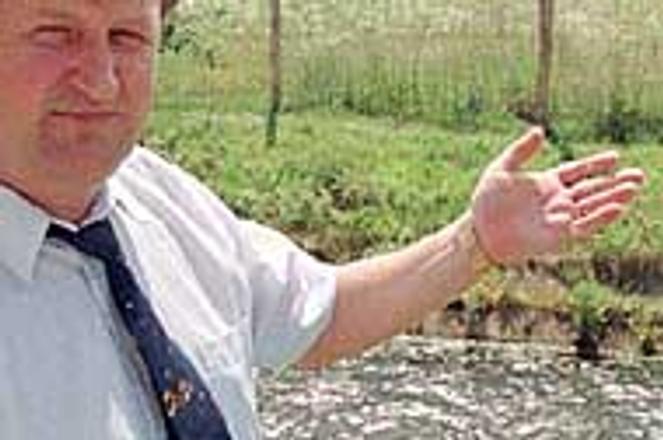KECHNEC Mayor Jozef Konkoly says he needs help with park.photo: TASR
THE CABINET approved an industrial park in the eastern Slovak village of Kechnec on April 25, enabling local backers to launch a long-awaited investment project to ease local unemployment.
The Kechnec industrial park, 17 km south of Slovakia's second largest city Košice, has been attracting the interest of investors since late 2001, but its opening has been hindered by bickering between local and state authorities over funding, and lack of manpower to bring the project to fruition.
"The problems that small towns have applying for [state funding for] industrial parks lie with insufficient administrative capacities. Kechnec Mayor Jozef Konkoly cannot handle it [administrative procedures] by himself, and there are only three people working on this project at Kechnec town hall," said Miroslav Poláček, director of small- and medium-sized enterprise support at the Economy Ministry.
Last summer Kechnec decided to take advantage of the new Law on Industrial Parks, which went into effect June 1, 2001. The act grants local communities state funds covering 70 per cent of the costs of land purchase and infrastructure in building an industrial park, as long as the project is approved by the cabinet.
"We started on this project in August 2001 and officially applied for industrial park status on February 2 this year," said Mayor Konkoly. "But the application approval [at Economy Ministry] has taken a very long time."
Artur Bobovnický, director of the Sario foreign investment agency, explained that legal issues related to land ownership had created obstacles, issues generated by the requirement that local governments foot 30 per cent of the bill.
"Slovak towns usually do not have enough money for this. So after they purchase all the land they need for an industrial park, which is now partially financed by the government, they then try to raise the money for their remaining 30 per cent share by selling the [industrial park] land to investors.
"However, with municipalities selling land, the state would be indirectly financing private property, which Slovak legislation does not allow." said Bobovnický.
"This is an artificial law - Slovak towns do not have the money to finance the preparation of industrial parks," added Sario industrial park specialist Radoslav Svrček.
Land ownership was also an issue with Kechnec, said Sario. "One of the potential investors in Kechnec demanded possession of the land, which, in this situation, is not allowed by law. That is one of the reasons why the application approval process has been hindered," said Svrček.
Sario helped to solve the situation, said Konkoly. "We sent our specialists to Kechnec and helped the town to complete the application process," said Bobovnický.
The opening of the industrial park will be a boon for the remote village and its surroundings, say backers. "Since 1996, state companies and collectives have been closing and people have been losing their jobs. The present unemployment rate in the village is 32 per cent," said Konkoly.
The Košice region had the country's highest unemployment rate in March, at 25.8 per cent, compared to a national average of 19.1 per cent.
Kechnec industrial park has so far attracted 11 interested companies, three of which have already signed investment contracts. Investments by these three companies should reach Sk2 billion and create 284 jobs.
The Dutch firm Viasystems is also considering Kechnec, but is putting off its decision until early May. If they decide to enter the park, their investments could reach $12 million and create 476 positions.


